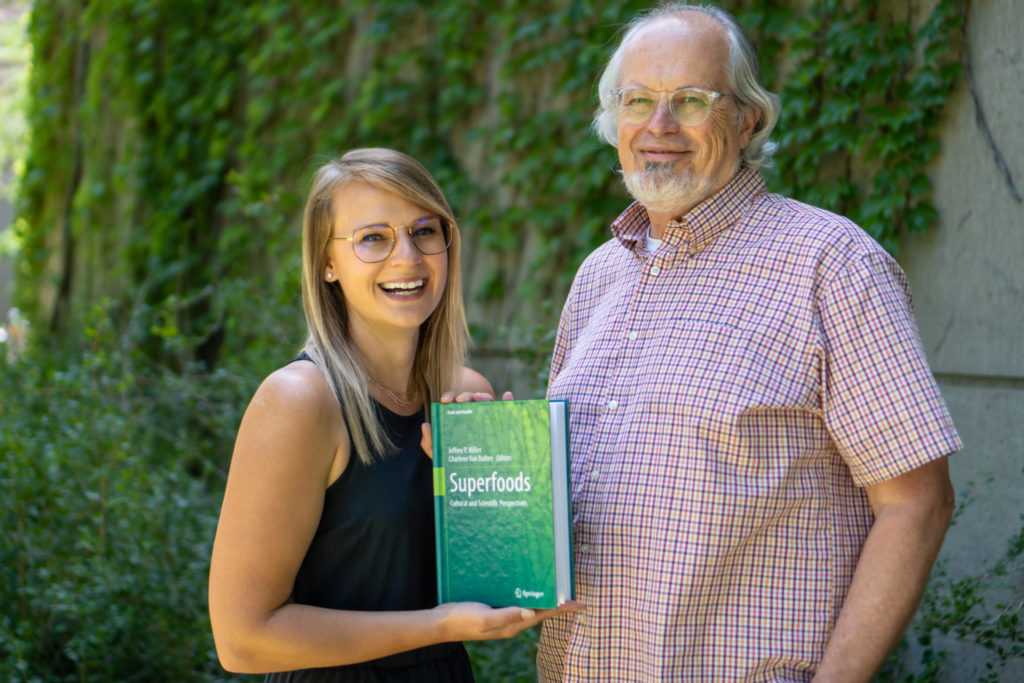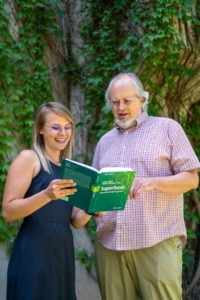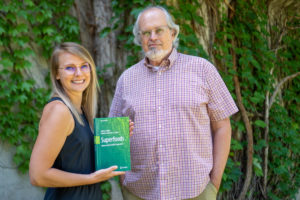
How can consumers digest information about superfoods to prioritize them in their budgets and diets? Two Colorado State University researchers in the Department of Food Science and Human Nutrition propose a palatable balance between jargon-filled scientific literature and trendy marketing ploys in their new book, Superfoods: Cultural and Scientific Perspectives.
In essence, superfoods offer nutrients and compounds that are beneficial to human health. Cultural and scientific contexts have influenced various ideologies behind superfoods, allowing for health advancements as well as creative marketing and diet fads.
Researchers Charlene Van Buiten and Jeffrey Miller, CSU faculty in food science and human nutrition have shaped the trajectory of superfood exploration.
Van Buiten has worked on researching the biological functionality of plant-based foods, while Miller has examined traditional food production, preservation methods, and the cultural histories of foods.
In Superfoods, Van Buiten and Miller work to eliminate the myths behind superfoods and advocate for their incorporation into people’s daily lives.
“With this book, we sought to write for a broad audience,” Van Buiten said. “Our hope is that anyone who reads this book will learn about these foods and the true science behind health claims associated with them and feel empowered with knowledge.”
Finding a balance
Superfoods adopts both scientific and cultural examinations of these foods to properly reach a large audience.

“We hope that writing about superfoods in jargon-free way that included cultural perspectives and solid nutritional information would help put useful material into readers’ hands so they could make some informed food choices,” Miller said.
Miller is well acclimated to writing for this audience, using similar practices of translating scientific information daily.
“As someone whose training was in the social sciences, I have to make these transitions and translations in my own head as I read scientific research,” Miller explained. “To be able to do this for the readers of the book was a real pleasure.”
The idea of what superfoods are can become very diluted, allowing for the general population to hold misconceptions about health benefits and overall availability.
“There is a lot of plain misleading information about food floating around on the internet and in public mythology,” he said.
Superfoods not only works at limiting misleading information, but simultaneously acts as a reference for those who are more knowledgeable on the benefits of any given superfood.
Science-based benefits
Superfoods educates readers on what types of foods earn the title of superfood. Van Buiten stressed that there is little truth to the idea that all superfoods are difficult to access or are expensive. “Many foods that are very healthy are among the cheapest you can buy,” she noted.
“When people think about superfoods, their first thought is of some exotic fruit that can only be purchased in specialty markets. I hope that this book will convey that there are foods that can be easily accessed in any grocery store – foods like grapes, yogurt, berries, and potatoes.”

Superfoods debunks the misconception that superfoods are all perishable and expensive. Some superfoods store well and offer options for budget-conscious shoppers, such as nutritionally dense nuts and seeds, and tea, which offers bioactive compounds.
An important aspect of this campaign is creating an understanding of how superfoods have affected health in historical and current contexts. Superfoods works as an effective catalyst for creating change in daily habits and speculations surrounding long-term dietary patterns.
“It’s important to remember that you can make good choices for yourself and your family without spending money on the ultra-premium option for these foods,” Van Buiten said. “Simply incorporating them into your regular diet can be enough!”
To learn more about Superfoods, visit the Springer publishing website.
The Department of Food Science and Human Nutrition is part of CSU’s College of Health and Human Sciences.